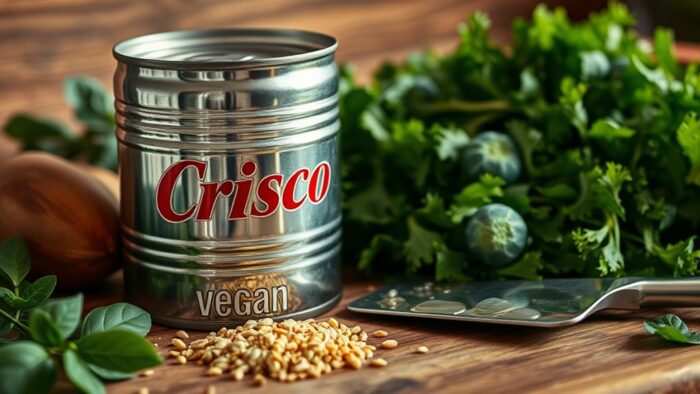Is Hummus A Vegan Food?
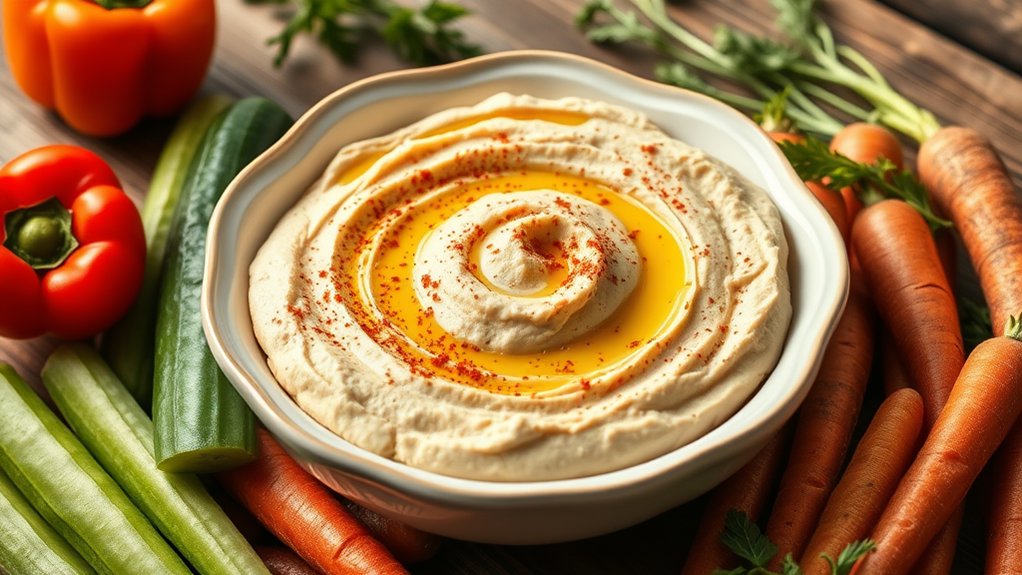
If you’re curious about whether hummus fits into your vegan lifestyle, you’re not alone! Many people are looking into plant-based diets and want to make certain their food choices align with their values. Understanding what’s in your food is essential, especially with so many options available. Hummus, a popular dip and spread, has a fascinating mix of ingredients that make it a staple in many kitchens. But, before you dive in, it’s important to think about where your hummus is coming from and what’s in it. Curious about how to enjoy hummus while sticking to a vegan diet? Let’s analyze!
Understanding Hummus: Traditional Ingredients

Hummus is a popular dip that primarily features chickpeas, which are an excellent source of plant-based protein, making it a nutritious option for those following a vegan diet.
The basic recipe includes tahini, which is made from ground sesame seeds. Tahini not only improves the creaminess of hummus but also contributes essential amino acids and healthy fats to the mix.
In addition to chickpeas and tahini, high-quality olive oil is often added for flavor and to provide heart-healthy monounsaturated fats. These traditional ingredients come together to create a dip that’s both satisfying and nutritious.
When looking into hummus recipes, it’s important to be aware of potential variations that may include non-vegan ingredients such as yogurt or cheese.
Sticking to the traditional ingredients confirms that you enjoy the authentic taste and benefits of hummus. This way, you can appreciate the pure essence of this beloved dip without encountering any unexpected ingredients.
Is Store-Bought Hummus Always Vegan?
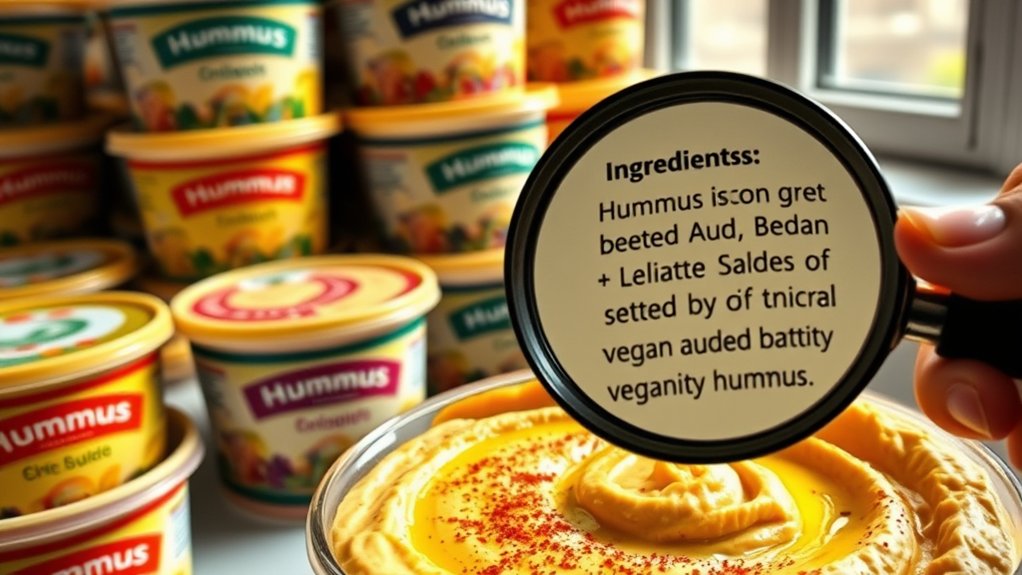
When you pick up a container of store-bought hummus, it’s a good idea to take a close look at the ingredient label. Some brands might include non-vegan ingredients like dairy or sugars that have been processed with bone char.
To make sure you’re staying true to your vegan diet, keep an eye out for certifications from trustworthy organizations on the packaging.
Speaking of ingredients, let’s talk about what to look for when making your own hummus at home.
Check Ingredient Labels
When it comes to store-bought hummus, not all options are vegan-friendly, making it crucial to check ingredient labels. Hidden non-vegan ingredients can sometimes be present, which might interfere with your dietary choices.
It’s important to know that some brands may use dairy products that aren’t immediately obvious. For example, terms like “natural flavors” can sometimes originate from animal sources, so it’s worth taking a closer look at the ingredient list.
Brands like Sabra provide both vegan and vegetarian hummus varieties, so make sure to check the specific product to confirm its vegan status. Additionally, companies such as Hope and Cedars Mediterranean Foods offer certified vegan lines, allowing you to choose with confidence.
Since there’s a possibility of cross-contamination in shared facilities, careful label reading is essential. This way, you can enjoy your hummus while staying true to your vegan lifestyle.
Vegan Certifications Available
When selecting store-bought hummus, understanding vegan certifications is crucial to assure that the product aligns with your dietary preferences. Certifications from reputable organizations, such as Vegan Action, indicate that a hummus is free from animal-derived ingredients and has been processed in a way that meets vegan standards.
Brands like Cedars Mediterranean Foods provide certified vegan hummus options, simplifying your shopping decisions. However, not all brands maintain the same commitment to vegan principles. For instance, while Sabra offers popular hummus varieties, it’s important to note that they may have both vegan and vegetarian options. This means reading labels is essential.
When checking the ingredients, pay particular attention to items like sugar. If the hummus contains sugar, look for organic options, as they’re generally not processed with bone char, which is a consideration for many vegans.
Common Non-Vegan Additives
While many store-bought hummus options are marketed as vegan, it’s essential to scrutinize ingredient lists for non-vegan additives that can compromise their plant-based status. By understanding these additives, you can make informed choices and enjoy hummus that aligns with your dietary preferences.
Key non-vegan additives to watch for include:
- Dairy Products: Some hummus may contain cheese or yogurt, which aren’t suitable for vegans.
- Refined Cane Sugar: This sweetener is often processed using bone char, making it non-vegan. Look for brands that use alternatives like organic cane sugar or other plant-based sweeteners.
- Natural Flavors: This term can be vague; some natural flavors may derive from animal sources. If you’re uncertain, it’s best to reach out to the manufacturer for clarification.
- Stabilizers and Emulsifiers: Certain stabilizers may not be plant-based, so it’s important to check the source of these ingredients.
Brands like Sabra provide a variety of hummus flavors, but they may offer both vegan and vegetarian options.
Always verify product specifications to assure that the hummus you choose is truly vegan. By being vigilant and informed about these additives, you can confidently select hummus that fits your dietary needs and enjoy it without worry.
Potential Non-Vegan Additives to Watch For
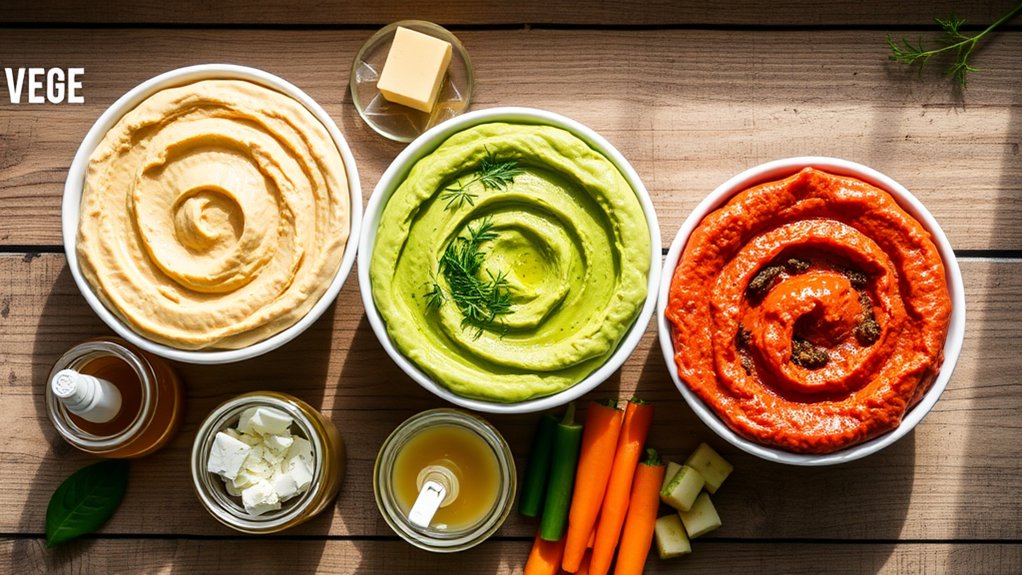
When selecting a container of hummus, it’s important to carefully examine the ingredient list, as some additives can impact its vegan status. Many commercial hummus brands include palm oil, which raises ethical sustainability concerns.
Additionally, refined sugar is often processed using bone char, making it unsuitable for strict vegans. Emulsifiers like lecithin can be derived from either soy or eggs, so it’s crucial to verify that the source is plant-based.
Furthermore, the term “natural flavors” can be ambiguous and may include non-vegan components sourced from animals. By being aware of these potential non-vegan additives, you can confirm that the hummus you choose aligns with your vegan lifestyle.
This approach not only supports your dietary choices but also promotes greater transparency and ethical sourcing in the food industry.
The Role of Sugar and Other Sweeteners
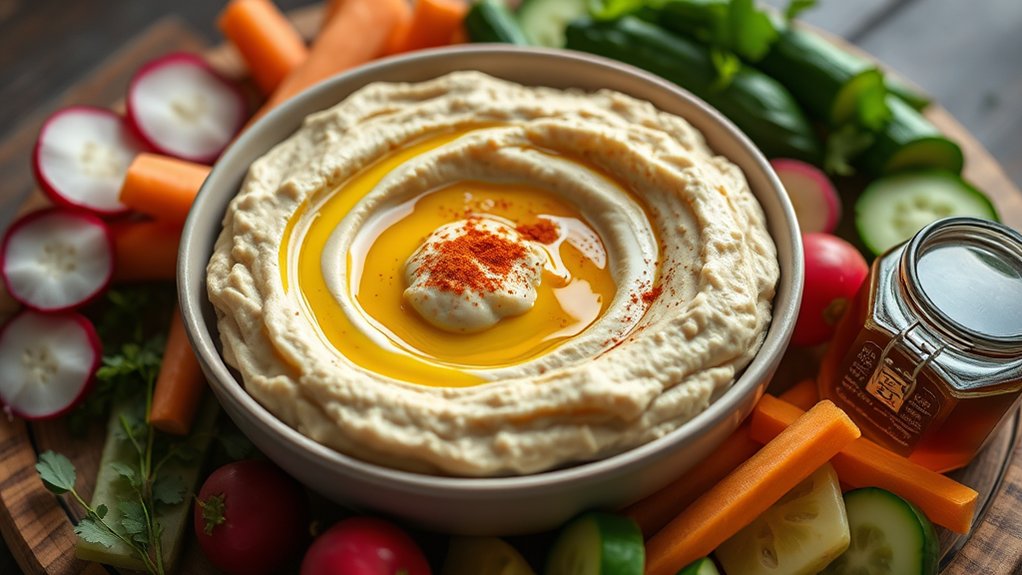
Sugar and other sweeteners are key ingredients that can increase the flavor of hummus. However, not all sweeteners are suitable for those following a vegan lifestyle. When making or purchasing hummus, it’s crucial to consider the type of sweeteners included.
Refined cane sugar is often processed using bone char, which may render it non-vegan. For a more vegan-friendly option, organic sugar is generally a better choice, as it adheres to USDA regulations for vegan standards.
Additionally, alternative sweeteners such as agave nectar and maple syrup are typically considered vegan, making them great options for sweetening hummus without compromising dietary principles.
Always take a moment to check ingredient labels for any added sugars that might contain non-vegan components. By being mindful of the sweeteners used, you can enjoy hummus that aligns with your values while still delivering on taste.
Common Variations of Hummus: Vegan or Not?
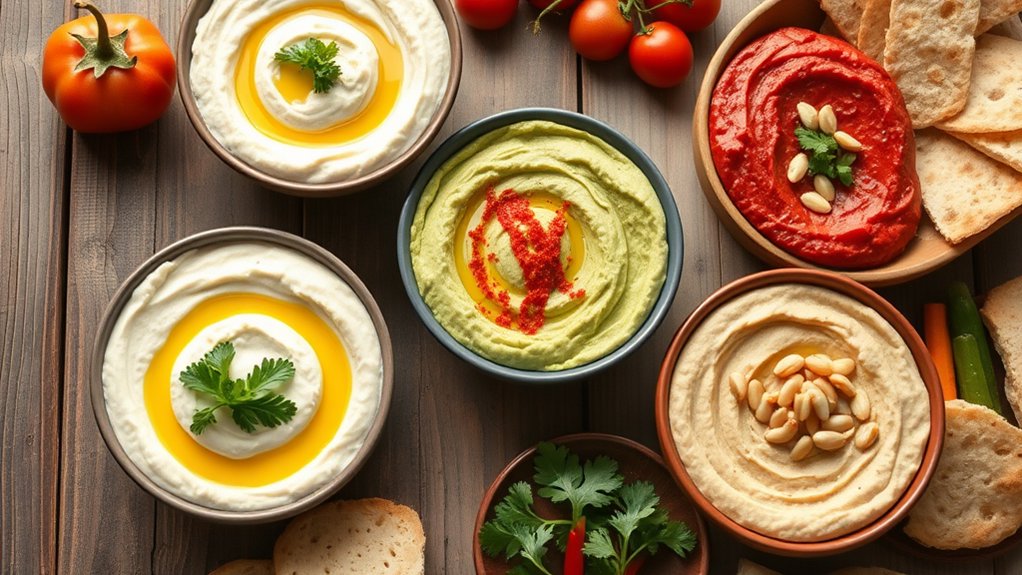
When it comes to hummus, the flavors you choose can really impact whether it’s vegan or not. Some popular variations might include non-vegan ingredients like yogurt or cheese to improve creaminess, so it’s a good idea to check the labels.
By checking out different ingredients, you can discover tasty, vegan-friendly options that maintain that plant-based goodness.
Speaking of looking into flavors, let’s dive into some unique hummus recipes you can try at home!
Popular Hummus Flavors
Hummus is a versatile and popular dip that appeals to both plant-based eaters and food enthusiasts. While classic hummus remains a well-loved favorite, there are many other delicious flavors available that cater to various tastes, most of which are vegan-friendly.
Some popular hummus flavors include:
- Roasted Red Pepper: This variety adds a sweet and smoky depth to the traditional hummus, making it a flavorful option for dipping or spreading.
- Garlic: Known for its robust taste, garlic hummus delivers a punch that garlic lovers will appreciate.
- Spicy Harissa: For those who enjoy a bit of heat, spicy harissa hummus offers a bold kick that enlivens the palate.
- Chocolate Hummus: A sweet twist on the traditional dip, chocolate hummus can be a delightful treat, but it’s important to check the label for any dairy content.
When choosing hummus, especially for a vegan diet, it’s worth noting that many artisanal and homemade varieties avoid animal products.
However, some flavors, such as tzatziki hummus, may contain yogurt, so it’s best to read the ingredient list carefully.
Brands like Sabra are transparent about their vegan offerings, making it easier for consumers to select options that align with their dietary preferences.
Ingredient Variations Explained
Hummus is a popular and versatile spread made primarily from chickpeas, tahini, and olive oil. However, when looking into the different flavors and varieties of hummus available in grocery stores, it’s essential to consider the ingredients, especially if you follow a vegan diet.
While many hummus brands offer delicious options, some flavors may contain dairy ingredients like yogurt or cheese, which would make them unsuitable for vegans. To confirm that you’re choosing a vegan-friendly hummus, always read the ingredient labels carefully.
Some brands use cane sugar that has been refined with bone char or include “natural flavors” that could originate from animal sources. Additionally, specialty varieties, such as those inspired by Greek cuisine, may also contain non-vegan ingredients.
When shopping, look for brands like Sabra, which offers both vegan and vegetarian hummus options. Checking for vegan certifications on packaging can help you make informed choices that align with your dietary preferences.
How to Identify Vegan Hummus Brands
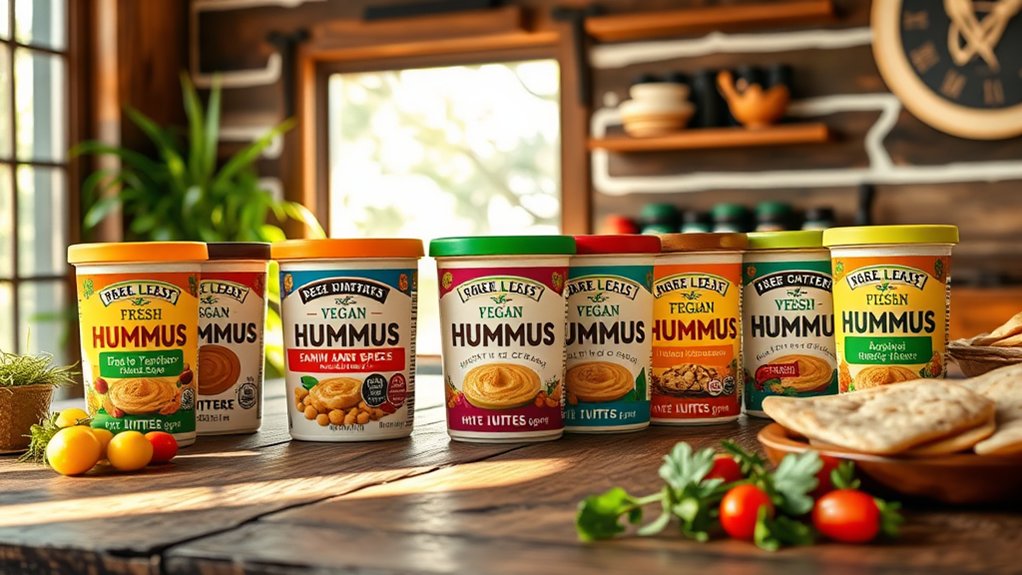
Choosing vegan hummus brands can feel overwhelming with so many options available, but there are effective strategies to help you make informed decisions. Start by looking for certification labels from reputable organizations such as Vegan Action. These labels indicate that the hummus is certified vegan and free from animal-derived ingredients.
When examining ingredient lists, it’s crucial to identify any non-vegan components. For example, some brands may include ingredients like honey or dairy products, which aren’t suitable for a vegan diet.
Consider trying well-known brands like Cedars Mediterranean Foods and Hope Hummus, which clearly label their certified vegan options. Additionally, organic hummus varieties are a good choice, as they’re less likely to contain refined cane sugar processed with bone char.
It’s also helpful to familiarize yourself with popular brands, such as Sabra, which offers both vegan and vegetarian flavors. When reviewing ingredient lists, be cautious of terms like “natural flavors,” as these can sometimes originate from animal sources.
The Benefits of Hummus for a Vegan Diet
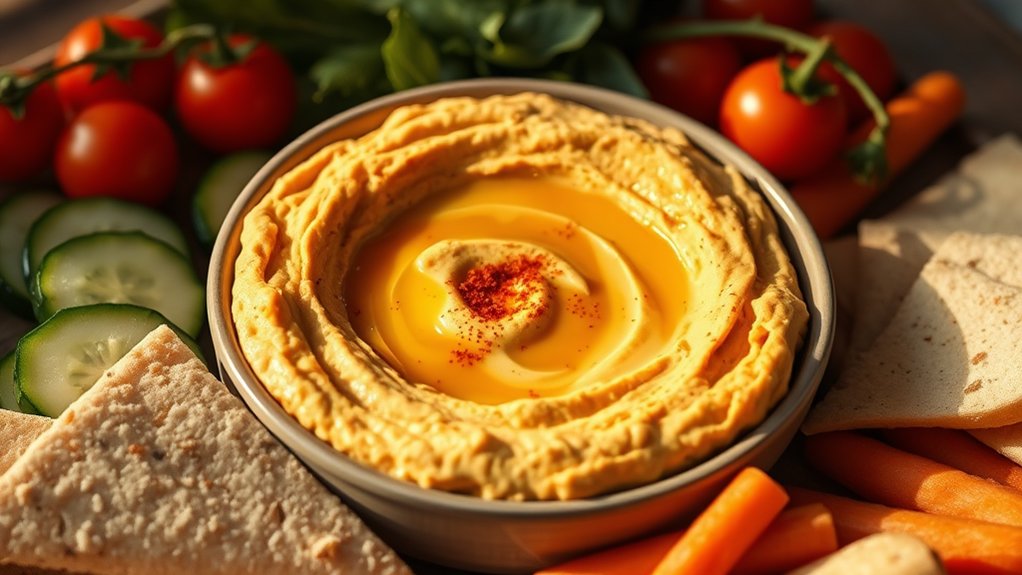
Selecting the right hummus brand can greatly improve your vegan diet, providing both flavor and nutrition. Hummus, primarily made from chickpeas and tahini, serves as a complete protein source, essential for maintaining muscle health and overall bodily functions. This means it provides all the essential amino acids your body needs, which is particularly important for those following a vegan lifestyle.
One of the standout benefits of hummus is its high fiber content. Dietary fiber plays a vital role in digestion, helping to regulate bowel movements and prevent constipation. Additionally, fiber contributes to a feeling of fullness, which can assist in weight management by reducing the likelihood of overeating.
Nutritionally, hummus is dense in both macronutrients and micronutrients. This means you can consume a significant amount of vitamins and minerals without consuming excessive calories. Chickpeas, the primary ingredient, are low in fat and cholesterol-free while being rich in essential nutrients like iron and magnesium. These nutrients are crucial for various bodily functions, including energy production and muscle function.
Incorporating hummus into your diet regularly can help improve your overall nutrient intake, improving the quality of your meals. It can be enjoyed in various ways: as a dip, a spread on sandwiches, or as a component of salads and grain bowls.
Can You Make Hummus at Home?
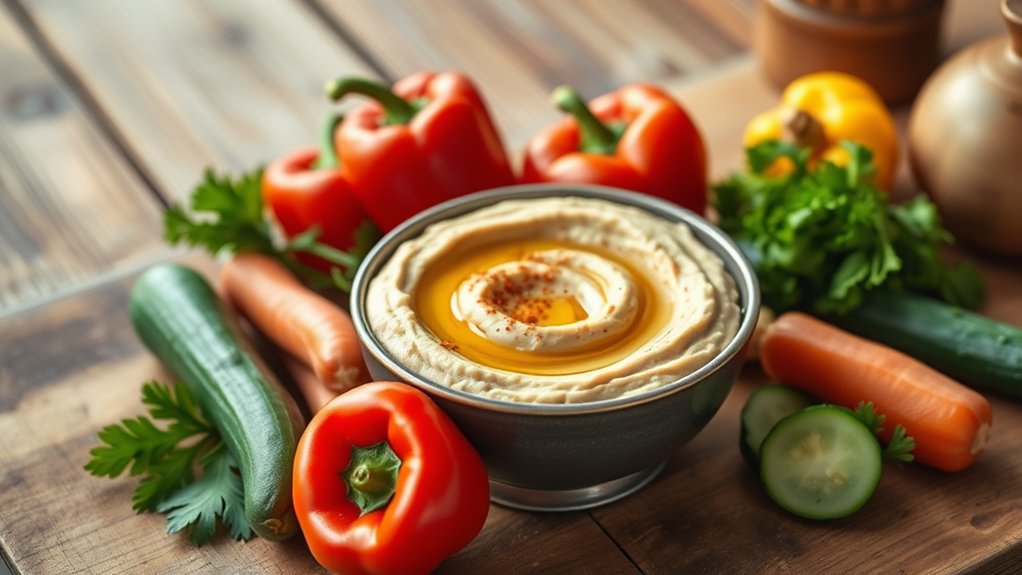
Making hummus at home is quite simple and gives you the freedom to choose your ingredients and flavors.
You’ll need some basic items like chickpeas, tahini, and lemon juice.
I’ll walk you through the preparation steps.
The best part is that you can adjust the taste to your liking, whether you want it spicy, herby, or creamy.
Now, let’s move on to the actual recipe and get started!
Essential Ingredients Needed
Making hummus at home is an easy and rewarding way to enjoy a healthy dip that you can customize to your liking. This naturally vegan dish isn’t only delicious but also packed with nutrients.
To prepare hummus, you’ll need a few essential ingredients that contribute to its rich flavor and creamy texture:
- 200 grams of canned chickpeas
- 1 tablespoon of tahini
- 1 tablespoon of olive oil
- 1 garlic clove
These core ingredients form the foundation of your hummus. The chickpeas provide protein and fiber, while tahini adds a unique nuttiness. Olive oil increases the creaminess and flavor, and garlic gives it a savory kick.
Once you have your ingredients, you can blend them together until smooth. If you prefer a thinner consistency, simply add a bit of water until you reach your desired thickness. Additionally, feel free to experiment with the quantities—more garlic for a stronger flavor, or spices like cumin and paprika for added depth.
Making hummus at home isn’t only straightforward but also cost-effective. It often costs significantly less than purchasing pre-made options at the store. Plus, you have full control over the ingredients, making certain that your hummus aligns with your dietary preferences.
Step-by-Step Preparation Guide
Hummus is an easy and nutritious dish that you can prepare in just a few minutes with the right ingredients. To get started, gather 200 grams of drained and rinsed canned garbanzo beans, 1 tablespoon of olive oil, 1 garlic clove, 1 tablespoon of tahini, and 1 teaspoon of lemon juice.
Place these ingredients in a blender and blend them until you achieve a smooth consistency. If the hummus is too thick, you can gradually add water to reach your preferred texture.
Once your hummus is creamy and well-blended, transfer it to a container for storage. It can be kept in the refrigerator for up to a week, making it a convenient option for quick snacks or meals.
Hummus is versatile and can be enjoyed with pita bread, fresh vegetables, or used as a spread on sandwiches.
This homemade hummus not only offers a delicious flavor but also provides a healthy source of plant-based protein and fiber, making it a great addition to any diet.
Enjoy the satisfaction of making this simple yet tasty dish!
Customization and Flavor Variations
Once you’ve perfected the basic preparation of hummus, customizing it with flavor variations can increase your experience. Making hummus at home allows you to have complete control over the ingredients, making sure they’re all vegan-friendly while also reflecting your personal taste.
To boost your hummus, consider adding roasted garlic. This ingredient introduces a rich, smoky flavor that can transform your dip. Fresh herbs like cilantro or basil can also be incorporated to provide a burst of freshness, making your hummus vibrant and aromatic.
Spices are another great way to experiment with flavors in your hummus. For instance, adding cumin can give your dip a warm, earthy note, while smoked paprika introduces a subtle, smoky essence that can be quite appealing.
If you’re looking to change the texture of your hummus, try substituting olive oil with tahini or avocado. Tahini can add a creamy richness, while avocado provides a smooth, buttery consistency that complements the chickpeas nicely.
Pairing Suggestions: What to Eat With Hummus
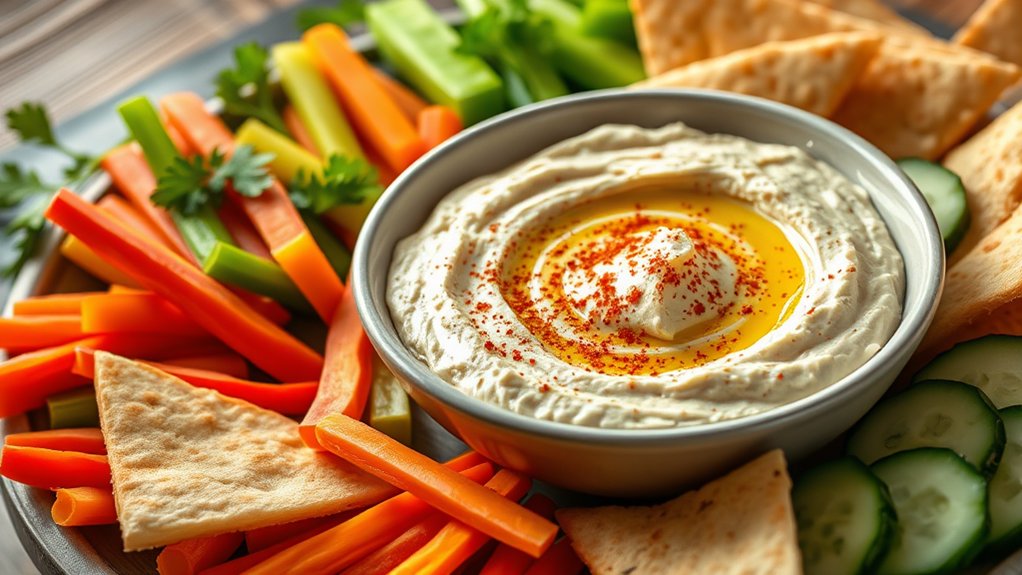
Hummus is a versatile dip that can boost your snacking experience through a variety of pairings. When considering what to eat with hummus, fresh vegetables are a classic choice. Crisp celery sticks offer a refreshing crunch that pairs well with the creamy consistency of hummus. Additionally, baby carrots and mini bell peppers add a pop of color and flavor to your snack platter.
If you’re looking for something on the sweeter side, consider pairing hummus with sliced apples or strawberries, especially if you’re enjoying dessert hummus varieties. These fruits can provide a nice balance to the savory flavors.
For a more filling option, wholemeal pita bread is an excellent choice. It not only complements the hummus but also adds nutritional value to your meal. Crunchy options like crackers or pita chips, such as Triscuits, can also boost the texture of your snacking experience.
Beyond traditional pairings, hummus can be creatively incorporated into various dishes. Try using it as a spread for quesadillas or veggie burgers instead of standard condiments. This not only adds flavor but also provides a healthier alternative.
Vegan Alternatives to Non-Vegan Hummus Ingredients
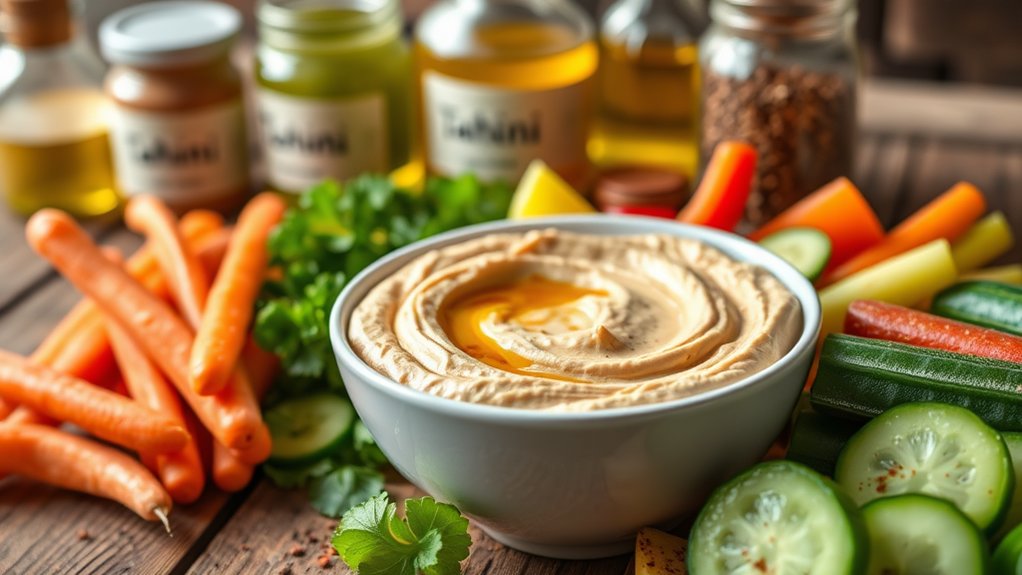
When making hummus, it’s essential to make certain that all ingredients support your vegan lifestyle. Choosing vegan-friendly options not only boosts the flavor of your hummus but also aligns with ethical eating practices.
Here are some important alternatives to consider:
- Organic Sweeteners: Instead of using refined sugar, which is often processed with bone char, opt for organic sweeteners like agave or maple syrup. These options provide sweetness without compromising your values.
- Plant-Based Oils: When selecting oils, prefer those made from olives rather than palm oil. This choice not only supports sustainable practices but also contributes to a richer taste in your hummus.
- Soy Lecithin: For a smooth and creamy texture, look for hummus that uses soy lecithin as an emulsifier. This plant-based ingredient is a great alternative to non-vegan stabilizers commonly found in some products.
- Certified Vegan Options: Always read labels carefully. Pay special attention to terms like “natural flavors,” and make sure there are no hidden dairy products. Choosing certified vegan options can help you avoid any unwanted ingredients.





